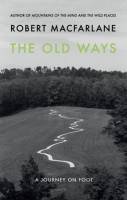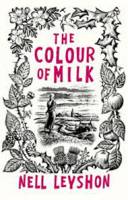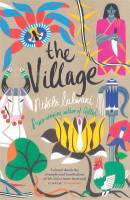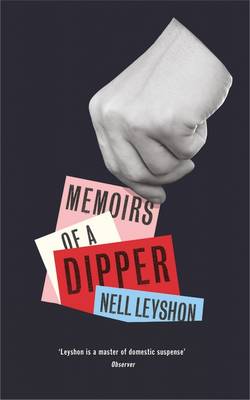On Thursday night, the good folks of Penguin General (the Fig Tree, Hamish Hamilton, and Viking imprints) hosted their second annual bloggers’ night, in the 5th View cocktail bar at Waterstones Piccadilly. This event was on a different scale from last year’s, with almost twice as many authors, and quite a few more bloggers – I don’t know if this was the largest-ever gathering of UK book bloggers, but I imagine it must have been close.
I was particularly pleased to get the chance to meet Nat Segnit, whose Pub Walks in Underhill Country was one of my favourite books from last year; he also gave one of the best readings of the night. But all twelve readings were good; so let’s go through them.
***
Naomi Alderman’s new novel is so new that there aren’t any advance copies yet, so she read from her laptop. The Liars’ Gospel is a retelling of the life and death of Jesus; Alderman read from the very beginning, which describes the ritual sacrifice of a lamb – and, if the rest of the book is as well-written as that, it’s one I want to read.

I already had a copy of Jennifer McVeigh’s debut, The Fever Tree, on the TBR pile. It’s set in South Africa in 1880, amid rumours of a smallpox epidemic in the diamond mines. There was some really good use of detail in the domestic scene which McVeigh read, and that bodes well for the rest of the novel.

Have I still never read anything by Marina Lewycka since A Short History of Tractors in Ukranian? (Answer: no, I haven’t.) I should probably rectify that, and Lewycka’s reading from Various Pets Alive and Dead was a good reminder of why. Her extract effectively sketched the four main characters in the novel, and included some sharp description of place.

Next up was Greg Baxter, whose first novel, The Apartment, was the second book from tonight already on my TBR pile. Baxter was a measured, precise reader, which went well with the spare style of his extract. I’m now still further intrigued to read the whole book.

22 Britannia Road by Amanda Hodgkinson tells of a Polish family reuniting in England after the war. I’m not quite sure whether this is a book for me, but I found the particular extract Hodgkinson read to be a good character sketch.

Now on to the only non-fiction book and author of the evening. The Old Ways by Robert Macfarlane is about the ancient paths ofBritain, the stories intertwined in them, and how people have been shaped by them. Macfarlane read an extract concerning an the encounter with Hanging figure by the sculptor Steve Dilworth; fascinating stuff, and definitely a book I’d like to read.

The second half of the evening began with Elif Shafak’s reading from her latest novel, Honour, which focuses on a Kurdish-Turkish family who move toLondon. Shafak read from the beginning of the book, where the daughter of the family prepares to meet her brother on his release from prison (he was convicted for murder). This was a strong set-up for the rest of the novel, and I look forward to reading on.

Set in 19th-centurySomerset, Nell Leyshon’s The Colour of Milk is the account of a girl named Mary, who is sent to work for the local vicar’s wife, where she has good reason to write down what happened to her. Leyshon’s excerpt gave a hint as to what that reason might be, and her reading brought Mary’s character vividly to life.

Then it was Nat Segnit’s turn to read from Pub Walks in Underhill Country – and it was just like discovering the book all over again. Segnit was an excellent reader (an audiobook of this read by him would be wonderful), and the extract he chose hilarious. Seriously, if you have not read this novel, you should.

From a novel I already loved to one of which I’d never even heard. Tom Bullough’s Konstantin is a fictional account of the life of the Russian rocket scientist Konstantin Tsiolkovsky; it was tricky to judge from the reading what the book as a whole might be like, but I started reading it on the train home, and it’s shaping up to be interesting.

The next author to take the stage was Nikita Lalwani, reading from her second novel, The Village. The set-up sounded intriguing – a documentary-maker travels fromEnglandto make a film about an Indian village which is also an open prison – and Lalwani’s reading only confirmed that view.

The evening closed with a reading from a Booker-winning author – James Kelman. Mo said she was quirky is a novel chronicling a day in the life of a single mother; on the evidence of Kelman’s reading, it’s also a novel very concerned with voice – it felt like a novel to be read out loud. I look forward to reading and finding out if that impression is correct.
***
And then, as Joshua Ferris put it, we came to the end. My thanks to everyone involved for such an enjoyable evening.
Like this:
Like Loading...









 You can read The Colour of Milk in one sitting, and I think doing so is the best way to experience this short, intense work. Set in 1830, it’s the account of Mary, a young farm girl who has acquired a measure of literacy and now sets out her story in her own halting prose. One summer, Mary is sent to work at the local vicarage, looking after the vicar’s sick wife; it’s clear from her tone that something bad has happened, but the full picture doesn’t emerge until the end.
You can read The Colour of Milk in one sitting, and I think doing so is the best way to experience this short, intense work. Set in 1830, it’s the account of Mary, a young farm girl who has acquired a measure of literacy and now sets out her story in her own halting prose. One summer, Mary is sent to work at the local vicarage, looking after the vicar’s sick wife; it’s clear from her tone that something bad has happened, but the full picture doesn’t emerge until the end.











Recent Comments